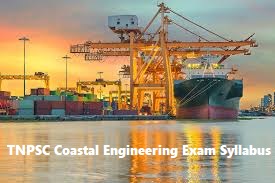TNPSC Coastal Engineering Exam Syllabus
Organisation : Tamil Nadu Public Service Commission (TNPSC)
Exam Name : TNPSC Coastal Engineering Examination
Standard : PG Degree Standard
Code : 358
Announcement : TNPSC Coastal Engineering Exam Syllabus
Website : https://www.tnpsc.gov.in/English/new_syllabus.html
What is TNPSC Coastal Engineering Exam?
Tamil Nadu Public Service Commission (TNPSC) conducts Combined Engineering Services Exam (CESE) every year for different posts in the department of Engineering and Administrative Services. Coastal and ocean engineering works across land, sea and the open ocean providing specialised knowledge to ensure safe and ecologically sustainable developments. This includes man-made developments such as ports and harbours as well as natural offshore sources and nearshore zones. The TNPSC Coastal Engineering Exam Syllabus are given below.
Related / Similar Syllabus : TNPSC Criminology Exam Syllabus

Syllabus For TNPSC Coastal Engineering Exam
The Syllabus For TNPSC Coastal Engineering Exam are given below,
UNIT-I : Coastal Environment
Beaches – Coastal features – Types of beaches – Physico-Chemical Properties of Coastal Environment – Characteristics of Coastal Water bodies – Bays, Backwaters and Lagoons – Coastal Zonation – EEZ – Inshore and Offshore Areas – Mean Sea level – Basics of Tides and Waves – Coastal Morphology – Characteristic features of Continental Shelf – Structure and Nature of Indian Coastals with reference to Fisheries – Tamil Nadu Coastals with reference to Fisheries.
UNIT-II : Waves & Tides Dynamics
Basics of waves – Classification – Wave Theory – Wave dynamics – Physical Characteristics of
different types of waves – Wave period – Linear Wave Theory – Wave celerity – Velocities –
Accelerations – Displacements – Wave dynamics in shallow and deep water conditions – Integral
properties of waves – Energy flux, Mass flux and Momentum flux – Wave transformations – Wave breaking and its types – Surfing – Wave dynamics in relation to fishing and harbour activities – Nature of waves in Indian and Tamil Nadu Coastal areas-Tides – Types and their dynamics in coastals.
UNIT-III : Coastal Processes
Physico, Chemical and Biological processes in Coastal ecosystems – Salt Marshes, Mangroves, Corals
and Sandy and Rocky Beaches – Sediments – Types and Characteristics – Nature of sediment
movement and Transportation – Sea water circulations and Sediment dynamics – Beach
nourishment through sedimentation – Sediment Budget and analysis – Total Sediment load
transportation calculation – Cross Shore Transport – Long shore transport (littoral drift) – Impact of Sediment dynamics on Coastal eco-system with special reference to fisheries and aquaculture activities in coastal areas.
UNIT-IV : Coastal Resources & Biodiversity
Living and Non-living resources of coastal areas – Biotic and Abiotic factors affecting the resources of Coastal areas – Renewable and Non-renewable energy sources in Coastal zones – Exploration of Coastal resources – Minerals – Placer and Hydrocarbon deposits – Nodules – Mineral Nodule extraction from coastal waters – Salt production from coastal waters – Living marine resources – Groups of animals – Economical, Ecological and Commercial importance of living Marine organisms – Management of Ecosystems and Large Marine Ecosystems – Marine parks and Protected Areas for conservation and management – Ecotourism – Biodiversity of different ecosystems – Mangroves,Corals, Sea grass beds – Coral reefs – Sustainable management of marine biodiversity – Community based coastal biodiversity management. Biodiversity of Indian coastal waters.

UNIT-V : Coastal Structures-Protection & Its Maintenance
Coastal structures – Types – Purpose of constuction/establishment – Piles – Moored structures –
Navigational aids – Harbour structures – Protection embankments – Enclosures – Large and Small submerged structures – Floating breakwaters – Underwater cables and Associated structures – Rubble mound structures – Groynes – Breakwaters – Detached breakwaters – Port and harbour breakwaters – Sea walls – Sills – Designs and construction of Sea walls and breakwaters – Stability and Maintenance of breakwaters – Electrochemical process – Corrosion and its types – Chemistry of corrosion – Oxidation of metals – Corrosion prevention – Methods – Coatings – Metallic, Inorganic and Dynamic coatings.
UNIT-VI : Integrated Coastal Zone Management(ICZM)
ICZM – Objectives – Basic Principles – ICZM framework – Zonation of coastal areas for better
Management – Dynamics of coastal areas – Productivity of coastal zones – Threats and Challenges for coastal bodies and their resources – Institutions involved in ICZM – Tools and techniques in ICZM – Community participation in ICZM – Legal policies and frame works in ICZM – International and National bodies and frameworks – Integration among sectors, Zones, Governments and disciplines – Problems and Challenges monitoring and evaluation of effectiveness of integration. ICZM in Indian and Tamilnadu coasts – Status of implementation – Problems and challenges.
Syllabus : http://www.syllabus.gen.in/uploads/pdf2022/2816-syllabus.pdf
UNIT-VII : Application Of Gis And Remote Sensing In Coastal Surveying & Management
Coastal Survey – Large scale & Small scale surveying – Various instruments used in surveying –
Hydrographic survey – Biological survey – GPS – Total stations used in surveying – Topographical surveying – Horizontal control methods – Vertical control methods – LIDAR surveying for digital elevation models – Acoustic Survey – Depth contour lines – Sound waves in water – Echosounder & SONAR – Principles & working – Hydrographical survey for fishing Harbour construction. Remote Sensing – Principles – OCEANSAT – Application of Remote sensing in coastal and ocean studies – SST – ISRO and coastal zone management – Digital image processing – Mapping of coastal ecosystem – Mangroves, corals, Seagrass etc., GIS – Principles – Methods and application in coastal management – GIS softwares – Application of GIS and Remote sensing in Indian coastal zone management.